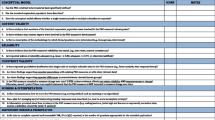Abstract
Reliability and validity are criteria used to assess metric adequacy and are typically quantified by correlation coefficients. Reliability is described as the extent to which repeated measurements yield consistent results. Validity is described as the extent to which a measure actually measures what it purports to measure. These conceptualizations are less useful when applied to measures of subjective outcomes because they do not convey other influences that “drive” correlation coefficients. Consistency is a manifestation of a reliable instrument but does not ensure that an instrument is reliable. Establishing the validity of an instrument is a complex process that is heavily dependent on an investigator’s hypothesis. Hence, validity coefficients may be more a reflection of hypothesis adequacy than of the extent to which instruments measure what they purport to measure. Appreciating how coefficients are influenced will better enable clinicians to assess the adequacy of subjective outcome measures.
Similar content being viewed by others
References
McDowell I, Newell C. Measuring Health: A Guide to Rating Scales and Questionnaires. 2nd ed. Oxford, England: Oxford University Press; 1996.
Nunnally JC, Bernstein IH. Psychometric Theory. 3rd ed. New York, NY: McGraw-Hill; 1994.
Bergner M. Measurement of health status. Med Care 1985;23:696–704.
Quality of life and clinical trials. Lancet. 1995;346:1–2. Editorial.
Stewart AL, Greenfield S, Hays RD, et al. Functional status and well-being of patients with chronic conditions: results from the Medical Outcomes Study. JAMA. 1989;262:907–13.
Kessler RC, Mroczek DK. Measuring the effects of medical interventions. Med Care. 1995;33:AS109–19.
Testa MA, Simpson DC. Assessment of quality-of-life outcomes. N Engl J Med. 1994;334:835–40.
Hulley SB, Cummings SR. Designing Clinical Research. Baltimore, Md: Williams & Wilkins; 1988:31–41.
Royce A, Singleton J, Straits BC, Staits MM. Approaches to Social Research. 2nd ed. New York, NY: Oxford University Press; 1993:114–30.
Fletcher RH, Fletcher SW, Wagner EH. Clinical Epidemiology: The Essentials. 3rd ed. Baltimore, Md: Williams & Wilkins; 1996:22–4.
DeVellis RF. Scale Development: Theory and Applications. Applied Social Research Methods Series. Newbury Park, Calif: Sage; 1991.
McCall R. Fundamental Statistics for Behavioral Sciences. 7th ed. Pacific Grove, Calif: Brooks/Cole; 1988:151–75.
Isaac S, Michael W. Handbook in Research and Evaluation for Education and the Behavioral Sciences. 3rd ed. San Diego, Calif: EDITS; 1995:174–80.
Perrin EB, Aaronson NK, Lohr KN, et al. Instrument review criteria. Med Outcomes Trust. 1997:1–5.
Sudman S, Bradburn NM. Asking questions: a practical guide to questionnaire design. In: Fiske DW, ed. Series in Social and Behavioral Sciences. San Francisco, Calif: Jossey-Bass; 1982.
Striener D, Norman G. Health measurement scales: a practical guide to their development and use. In: Striener D, Norman G, eds. 2nd ed. New York, NY: Oxford University Press; 1995:150–7.
Stewart AL, Hays RD, Ware JE. The MOS Short-Form General Health Survey: reliability and validity in a patient population. Med Care. 1988;26:724–32.
Rosenstock I, Strecher V, Becker M. Social learning theory and the health belief model. Health Educ Q. 1988;15:175–83.
Author information
Authors and Affiliations
Additional information
From Research to Practice, a Journal series, presents articles to heighten the clinician’s awareness of research and methodology issues that have direct relevance to practice. If you wish to submit a manuscript for consideration for this series, please contact Cynthia D. Mulrow, MD, MSc, Associate Editor, at mulrowc @uthscsa.edu, or contact the Journal of General Internal Medicine at (215) 823-4471 to receive the appropriate guidelines.
Rights and permissions
About this article
Cite this article
Elasy, T.A., Gaddy, G. Measuring subjective outcomes. J GEN INTERN MED 13, 757–761 (1998). https://doi.org/10.1046/j.1525-1497.1998.00228.x
Issue Date:
DOI: https://doi.org/10.1046/j.1525-1497.1998.00228.x




